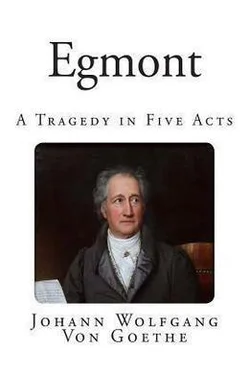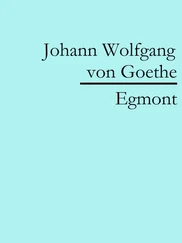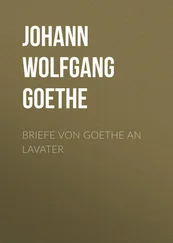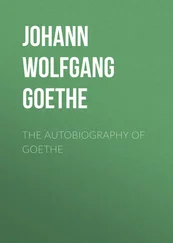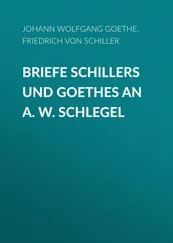Johann von Goethe - Egmont
Здесь есть возможность читать онлайн «Johann von Goethe - Egmont» весь текст электронной книги совершенно бесплатно (целиком полную версию без сокращений). В некоторых случаях можно слушать аудио, скачать через торрент в формате fb2 и присутствует краткое содержание. Год выпуска: 2015, Издательство: epubBooks Classics, Жанр: Драматургия, на английском языке. Описание произведения, (предисловие) а так же отзывы посетителей доступны на портале библиотеки ЛибКат.
- Название:Egmont
- Автор:
- Издательство:epubBooks Classics
- Жанр:
- Год:2015
- ISBN:нет данных
- Рейтинг книги:4 / 5. Голосов: 1
-
Избранное:Добавить в избранное
- Отзывы:
-
Ваша оценка:
- 80
- 1
- 2
- 3
- 4
- 5
Egmont: краткое содержание, описание и аннотация
Предлагаем к чтению аннотацию, описание, краткое содержание или предисловие (зависит от того, что написал сам автор книги «Egmont»). Если вы не нашли необходимую информацию о книге — напишите в комментариях, мы постараемся отыскать её.
Egmont — читать онлайн бесплатно полную книгу (весь текст) целиком
Ниже представлен текст книги, разбитый по страницам. Система сохранения места последней прочитанной страницы, позволяет с удобством читать онлайн бесплатно книгу «Egmont», без необходимости каждый раз заново искать на чём Вы остановились. Поставьте закладку, и сможете в любой момент перейти на страницу, на которой закончили чтение.
Интервал:
Закладка:
Egmont
A Tragedy in Five Acts
Johann Wolfgang von Goethe
Introductory Note
In 1775, when Goethe was twenty–six, and before he went to Weimar, he began to write "Egmont" After working on it at intervals for twelve years, he finished it at Rome in 1787.
The scene of the drama is laid in the Low Countries at the beginning of the revolt against Spain. In the fifteenth century Philip of Burgundy had usurped dominion over several of the provinces of the Netherlands, and through him they had passed into the power of his descendant, the Emperor Charles V. This powerful ruler abolished the constitutional rights of the provinces, and introduced the Inquisition in order to stamp out Protestantism. Prominent among his officers was the Fleming, Lamoral, Count Egmont, upon whom he lavished honors and opportunities of service—opportunities so well improved that, by his victories over the French at Saint–Quentin (1557) and Gravelines (1558) Egmont made a reputation as one of the most brilliant generals in Europe, and became the idol of his countrymen. When in 1559 a new Regent of the Netherlands was to be created, the people hoped that Philip II, who had succeeded Charles, would choose Egmont; but instead he appointed his half–sister Margaret, Duchess of Parma. Under the new Regent the persecution of the Protestants was rigorously pressed, and in 1565 Egmont, though a Catholic, was sent to Madrid to plead for clemency. He was received by the King with every appearance of cordiality, but shortly after his return home the Duke of Alva was sent to the Netherlands with instructions to put down with an iron hand all resistance to his master's will. How terribly he carried out his orders has been told by Prescott and Motley. Egmont was an early victim, but his martyrdom, with that of Count Horn, and later the assassination of William of Orange, roused the Netherlands to a resistance that ended only with the complete throwing off of the Spanish yoke.
Such in outline is the background chosen by Goethe for his tragedy. With many changes in detail, the dramatist has still preserved a picture of a historical situation of absorbing interest, and has painted a group of admirable portraits. The drama has long been a favorite on the stage, where it enjoys the advantage of Beethoven's musical setting.
Dramatis Personae
Margaret of Parma, (Daughter of Charles V., and Regent of the Netherlands)
Count Egmont, (Prince of Gaure)
The Duke of Alva
William of Orange
Ferdinand, (his natural Son)
Machiavel, in the service of the Regent
Richard, (Egmont's Private Secretary)
Silva, Gomez, (in the service of Alva)
Clara, (the Beloved of Egmont)
Her Mother
Brackenburg, (a Citizen's Son), and Vansen, (a Clerk)
Soest, (a Shopkeeper), Jetter, (a Tailor), A Carpenter, A Soapboiler (Citizens of Brussels)
Buyck, (a Hollander), a Soldier under Egmont
Ruysum, (a Frieslander), an invalid Soldier, and deaf
People, Attendants, Guards, etc.
The Scene is laid in Brussels.
Act I
Scene I
Soldiers and Citizens (With Cross-bows)
Jetter (steps forward, and bends his cross–bow). Soest, Buyck, Ruysum
Soest. Come, shoot away, and have done with it! You won't beat me! Three black rings, you never made such a shot in all your life. And so I'm master for this year.
Jetter. Master and king to boot; who envies you? You'll have to pay double reckoning; 'tis only fair you should pay for your dexterity.
Buyck. Jetter, I'll buy your shot, share the prize, and treat the company. I have already been here so long, and am a debtor for so many civilities. If I miss, then it shall be as if you had shot.
Soest. I ought to have a voice, for in fact I am the loser. No matter! Come, Buyck, shoot away.
Buyck (shoots). Now, corporal, look out!—One! Two! Three! Four!
Soest. Four rings! So be it!
All. Hurrah! Long live the King! Hurrah! Hurrah!
Buyck. Thanks, sirs, master even were too much! Thanks for the honour.
Jetter. You have no one to thank but yourself. Ruysum. Let me tell you—
Soest. How now, grey–beard?
Ruysum. Let me tell you!—He shoots like his master, he shoots like Egmont.
Buyck. Compared with him I am only a bungler. He aims with the rifle as no one else does. Not only when he's lucky or in the vein; no! he levels, and the bull's–eye is pierced. I have learned from him. He were indeed a blockhead, who could serve under him and learn nothing!—But, sirs, let us not forget! A king maintains his followers; and so, wine here, at the king's charge!
Jetter. We have agreed among ourselves that each—
Buyck. I am a foreigner, and a king, and care not a jot for your laws and customs.
Jetter. Why, you are worse than the Spaniard, who has not yet ventured to meddle with them.
Ruysum. What does he say?
Soest (loud to Ruysum). He wants to treat us; he will not hear of our clubbing together, the king paying only a double share.
Ruysum. Let him! under protest, however! 'Tis his master's fashion, too, to be munificent, and to let the money flow in a good cause. (Wine is brought.)
All. Here's to his Majesty! Hurrah!
Jetter (to Buyck). That means your Majesty, of course, Buyck. My hearty thanks, if it be so.
Soest. Assuredly! A Netherlander does not find it easy to drink the health of his Spanish majesty from his heart.
Ruysum. Who?
Soest (aloud). Philip the Second, King of Spain.
Ruysum. Our most gracious king and master! Long life to him.
Soest. Did you not like his father, Charles the Fifth, better?
Ruysum. God bless him! He was a king indeed! His hand reached over the whole earth, and he was all in all. Yet, when he met you, he'd greet you just as one neighbour greets another,—and if you were frightened, he knew so well how to put you at your ease—ay, you understand me—he walked out, rode out, just as it came into his head, with very few followers. We all wept when he resigned the government here to his son. You understand me—he is another sort of man, he's more majestic.
Jetter. When he was here, he never appeared in public, except in pomp and royal state. He speaks little, they say.
Soest. He is no king for us Netherlanders. Our princes must be joyous and free like ourselves, must live and let live. We will neither be despised nor oppressed, good–natured fools though we be.
Jetter. The king, methinks, were a gracious sovereign enough, if he had only better counsellors.
Soest. No, no! He has no affection for us Netherlanders; he has no heart for the people; he loves us not; how then can we love him? Why is everybody so fond of Count Egmont? Why are we all so devoted to him? Why, because one can read in his face that he loves us; because joyousness, open–heartedness, and good–nature, speak in his eyes; because he possesses nothing that he does not share with him who needs it, ay, and with him who needs it not. Long live Count Egmont! Buyck, it is for you to give the first toast; give us your master's health.
Buyck. With all my heart; here's to Count Egmont! Hurrah!
Ruysum Conqueror of St. Quintin.
Buyck. The hero of Gravelines.
All. Hurrah!
Ruysum. St. Quintin was my last battle. I was hardly able to crawl along, and could with difficulty carry my heavy rifle. I managed, notwithstanding, to singe the skin of the French once more, and, as a parting gift, received a grazing shot in my right leg.
Buyck. Gravelines! Ha, my friends, we had sharp work of it there! The victory was all our own. Did not those French dogs carry fire and desolation into the very heart of Flanders? We gave it them, however! The old hard–listed veterans held out bravely for a while, but we pushed on, fired away, and laid about us, till they made wry faces, and their lines gave way.
Читать дальшеИнтервал:
Закладка:
Похожие книги на «Egmont»
Представляем Вашему вниманию похожие книги на «Egmont» списком для выбора. Мы отобрали схожую по названию и смыслу литературу в надежде предоставить читателям больше вариантов отыскать новые, интересные, ещё непрочитанные произведения.
Обсуждение, отзывы о книге «Egmont» и просто собственные мнения читателей. Оставьте ваши комментарии, напишите, что Вы думаете о произведении, его смысле или главных героях. Укажите что конкретно понравилось, а что нет, и почему Вы так считаете.
